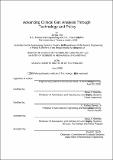Advancing clinical gait analysis through technology and policy
Author(s)
Tan, Junjay
DownloadFull printable version (3.055Mb)
Other Contributors
Massachusetts Institute of Technology. Dept. of Mechanical Engineering.
Advisor
Dava J. Newman.
Terms of use
Metadata
Show full item recordAbstract
Quantitatively analyzing human gait biomechanics will improve our ability to diagnose and treat disability and to measure the effectiveness of assistive devices. Gait analysis is one technology used to analyze walking, but technical as well as economic, social, and policy issues hinder its clinical adoption. This thesis is divided into two parts that address some of these issues. Part I focuses on the role public policies have in advancing gait analysis. Through an analysis of gait analysis technologies, case studies of MRI and CT Angiography, and a high-level analysis of data standards used in gait analysis, it concludes that policies cannot directly create the institutional structures and the data standards required to advance gait analysis as a clinical diagnostic tool. Only through indirect means, such as research funding, can policies support the development of organizations to take ownership of gait analysis technologies. Part I also concludes that policies should not fund development of gait technologies but instead should fund research units working on data standards and accurate human body models. Part II focuses on a technical issue in gait analysis, namely, how to address uncertainties in joint moment calculations that occur from using different body segment inertial parameter estimation models. This is identified as a technical issue needing attention from our broader policy analysis in Part I. Using sensitivity studies of forward dynamics computer simulations coupled with an analysis of the dynamical equations of motion, Part II shows that joint moment variations resulting from different segment inertial parameters are significant at some parts of the gait cycle, particularly heel strike and leg swing. (cont.) It provides recommendations about which segment inertial parameters one should estimate more accurately depending on which joints and phases of the gait cycle one is interested in analyzing.
Description
Thesis (S.M. in Technology and Policy)--Massachusetts Institute of Technology, Engineering Systems Division, Technology and Policy Program; and, (S.M.)--Massachusetts Institute of Technology, Dept. of Mechanical Engineering, 2009. This electronic version was submitted by the student author. The certified thesis is available in the Institute Archives and Special Collections. Includes bibliographical references (p. 161-165).
Date issued
2009Department
Massachusetts Institute of Technology. Department of Mechanical Engineering; Massachusetts Institute of Technology. Engineering Systems Division; Technology and Policy ProgramPublisher
Massachusetts Institute of Technology
Keywords
Engineering Systems Division., Technology and Policy Program., Mechanical Engineering.